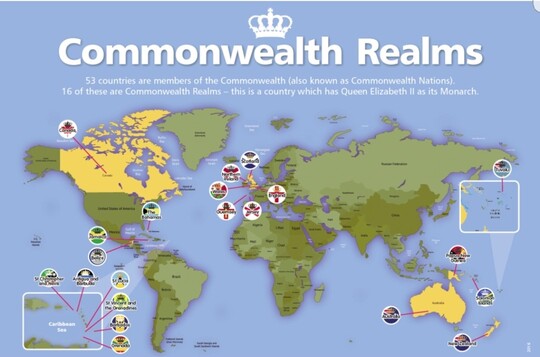Future of the Commonwealth change (GS Paper 2, International Relation)

Context:
- The death of Queen Elizabeth II of the United Kingdom, who reigned for over 70 years, marks not only the end of an era for the British monarchy but also a turning point for the 14 Commonwealth realms of which she was the Head of State.
More Republics:
- There has been a significant transformation of the socioeconomic milieu in these countries compared to the Elizabethan era, including calls in several nations to establish a republic and break free of historical ties to the British monarchy.
- Thus, it is possible that during the reign of the incumbent King Charles III, the Queen’s successor, more nations will follow in the footsteps of Barbados, which in 2021 became the 18th country to remove the British monarch from the role of head of state and substitute them with a national government functionary.
What is the Commonwealth and what are its realms?
- The Commonwealth of Nations is a group of 56 countries comprised mostly of former British colonies.
- While members of the Commonwealth are predominantly located in Africa, the Americas, Asia, and the Pacific, with many of them emerging economies, the three European members of the group are Cyprus, Malta, and the U.K.
- The developed nations of the Commonwealth are Australia, Canada, and New Zealand.
- The Commonwealth consists of both republics and realms.
- The British monarch is the Head of State for the realms, whereas the republics are ruled by elected governments, except in the case of five countries; Brunei Darussalam, Eswatini, Lesotho, Malaysia, and Tonga, each a self-governed monarchy.
- The realms are comprised of Antigua and Barbuda, Australia, the Bahamas, Belize, Canada, Grenada, Jamaica, New Zealand, Papua New Guinea, Saint Kitts and Nevis, Saint Lucia, Saint Vincent and the Grenadines, the Solomon Islands, and Tuvalu.
How is the Commonwealth viewed by its members?
- Even if the situation is changing vis-à-vis the realms and their Heads of State, the broader Commonwealth group, of which India and other South Asian countries are members, remains strong and fosters policy coordination among its members through its Heads of Government Meetings, a feature that has gained additional salience in the context of post-pandemic economic recovery.
- In this regard, Queen Elizabeth played a critical role in championing the organisation and maintaining the group’s relevance, regularly travelling to meet with leaders of Commonwealth nations across the world.
- This has not always been the case. During the Queen’s third and final visit to India in 1997, many expected an apology for the Jallianwalla Bagh massacre of 1919, carried out by the erstwhile colonial government, and ordered by General Reginald Dyer. Yet that apology never came.
- It was also in 1997 that the U.K. handed over control of Hong Kong to the People’s Republic of China, thereby losing after 156 years what was considered to be one of the most important colonies in Asia.
- More recently, in March 2022, King Charles’ son and now heir to the throne, Prince William, his wife, Kate, and other royals faced demonstrations and demands for reparations for slavery while on a tour of the Caribbean that also witnessed several gaffes and awkward moments by the visitors from the U.K.
Which nations are moving towards ending formal ties to the British monarchy?
- The debate in some of the Commonwealth realms, including for example Australia, has led to popular movements to reposition the country in question as a republic.
- In Canberra, the administration of Australian Prime Minister Anthony Albanese appointed in June 2022 for the first time a Minister, Matt Thistlethwaite, to set in motion the gradual transition towards a republic. In this regard it is likely that there will be a referendum on the question of severing official ties to the monarchy in the months ahead.
- While Prime Minister of New Zealand has said that her country would support King Charles, she added that it would become a republic “in time”.
- Similarly, Prime Minister of the Bahamas has said he intends to conduct a referendum to remove King Charles from the role of official Head of State, thereby moving the country, which gained independence in 1973, towards being a republic.
- Governments in five other Caribbean nations; Antigua and Barbuda, Belize, Grenada, Jamaica and Saint Kitts and Nevis have signalled their intention to act similarly.
Way Forward:
- Thus, it is not beyond imagination that following the death of Queen Elizabeth, the Commonwealth realms might fade into being a relic of the past, and nations that suffered a history of colonialism, along with its attendant violence and resource extraction will move forward to establish themselves as republics.


